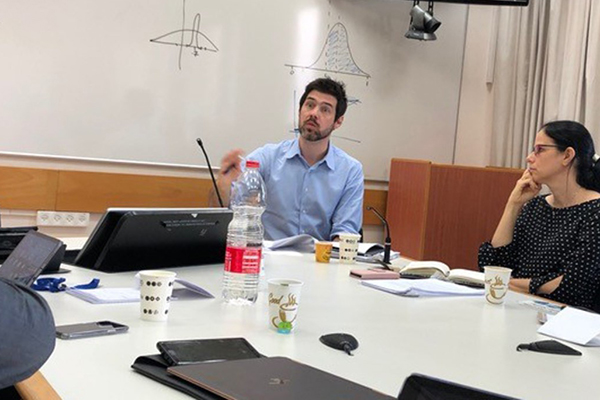Professors Eisenberg & Spottswood Speak at Tel Aviv Conference

TALLAHASSEE — FSU Professors Avlana K. Eisenberg and Mark Spottswood were invited to present papers at a conference on legal discontinuity held at Tel Aviv University in Israel on December 29 and 30, 2019. The conference was hosted by the Cegla Center for Interdisciplinary Research of the Law at the Buchmann Faculty of Law at Tel Aviv University and organized by Professor Adam Kolber, of Brooklyn Law School, and Professor Talia Fisher, of Tel Aviv University. Presented papers will be published in an open-access issue of Theoretical Inquiries in Law, allowing contributions to be widely shared.
“The conference concerns a variety of ways in which the law deals with phenomena that spread across spectra,” said Kolber in his invitation to Spottswood. “The law’s discontinuities have received attention in specific contexts, but the connections among them have often been neglected, and we believe that a conference can enrich the discussion.” By discontinuities, the invitation refers to laws or rules that separate the activities into discrete buckets for differential legal treatment.
Eisenberg’s essay examines conceptual, doctrinal and practical obstacles to smoothing out discontinuities between inputs and outputs in criminal law. It exposes the challenge of calibrating punishment outputs across distinct physical spaces, especially in light of the chasm—doctrinally and experientially—between custodial and non-custodial punishments. It also examines the role of stigma, which may far outlast a person’s formal punishment, thus skewing otherwise fine-tuned input/output relationships. The essay reveals that the law’s classification of inputs—for example, the input of reasonableness—is itself contestable and responsible for a range of hard-to-resolve discontinuities. Since joining the FSU Law faculty in 2015, Eisenberg has taught Criminal Law, Criminal Procedure, and Prison Law and Policy.
Spottswood’s paper is about the relationship between different kinds of burden of persuasion rules and civil settlements. Using a data simulation method based on economic models of settlement behavior, he offers evidence that our traditional, discontinuous burden of proof yields weaker incentives to settle cases, when compared with continuous burden of proof rules. At the same time, his analysis suggests that settlements produced by the discontinuous rule tend to be fairer, on average, than the settlements we should expect to see under the alternative rules. Spottswood teaches Evidence, Civil Procedure, Scientific Evidence, and Advanced Civil Procedure. He has been a member of the FSU Law faculty since 2011.

